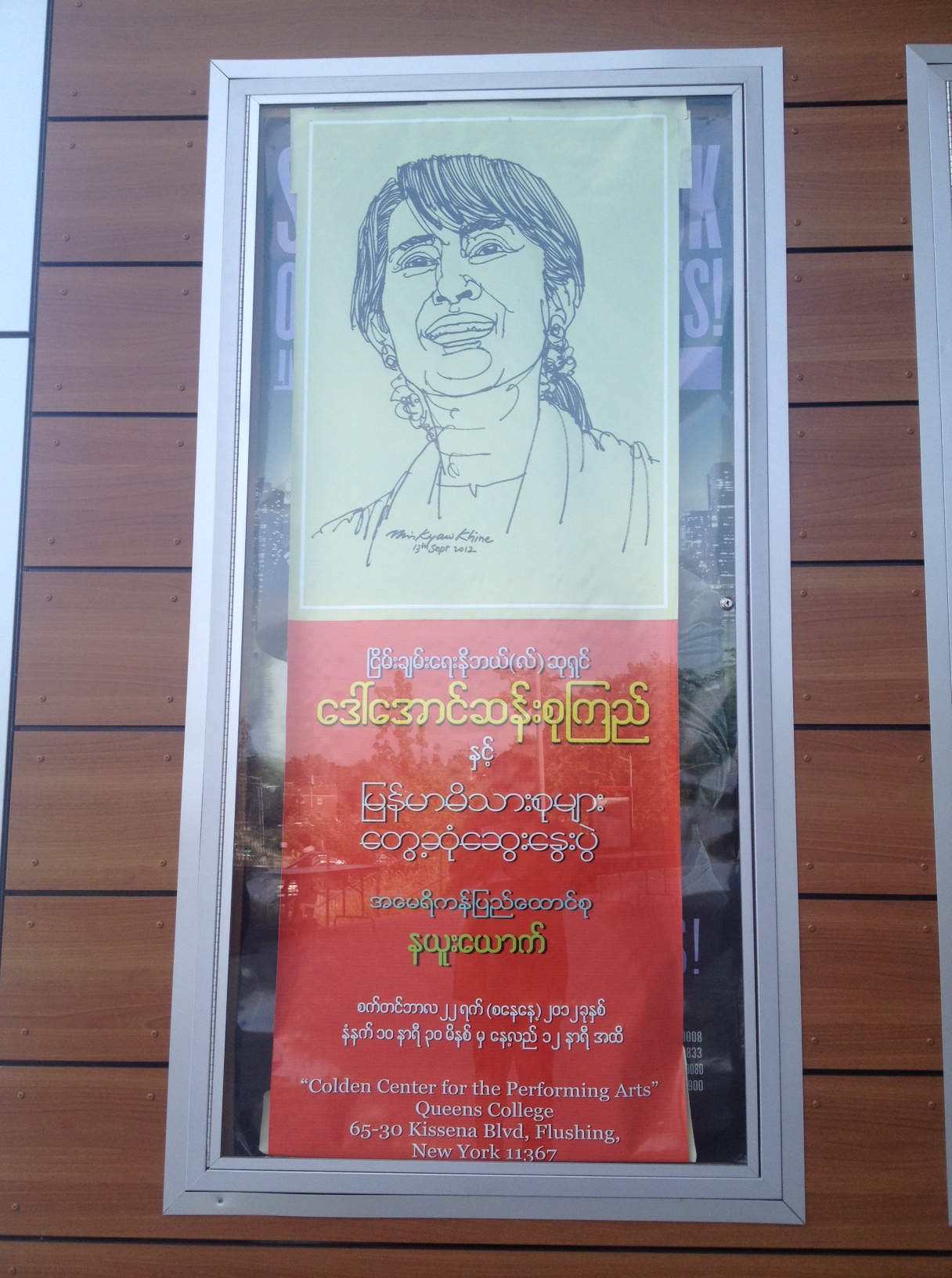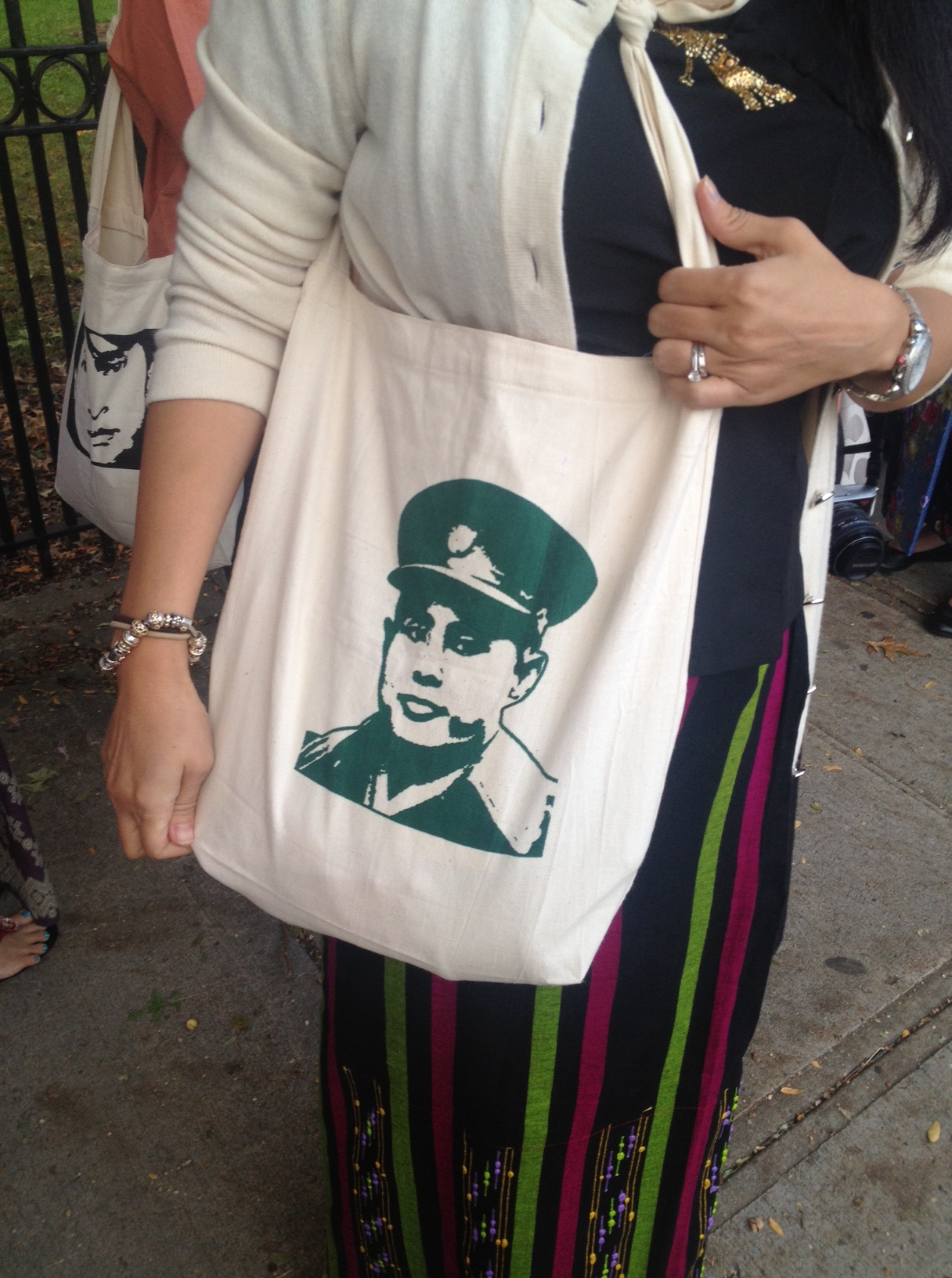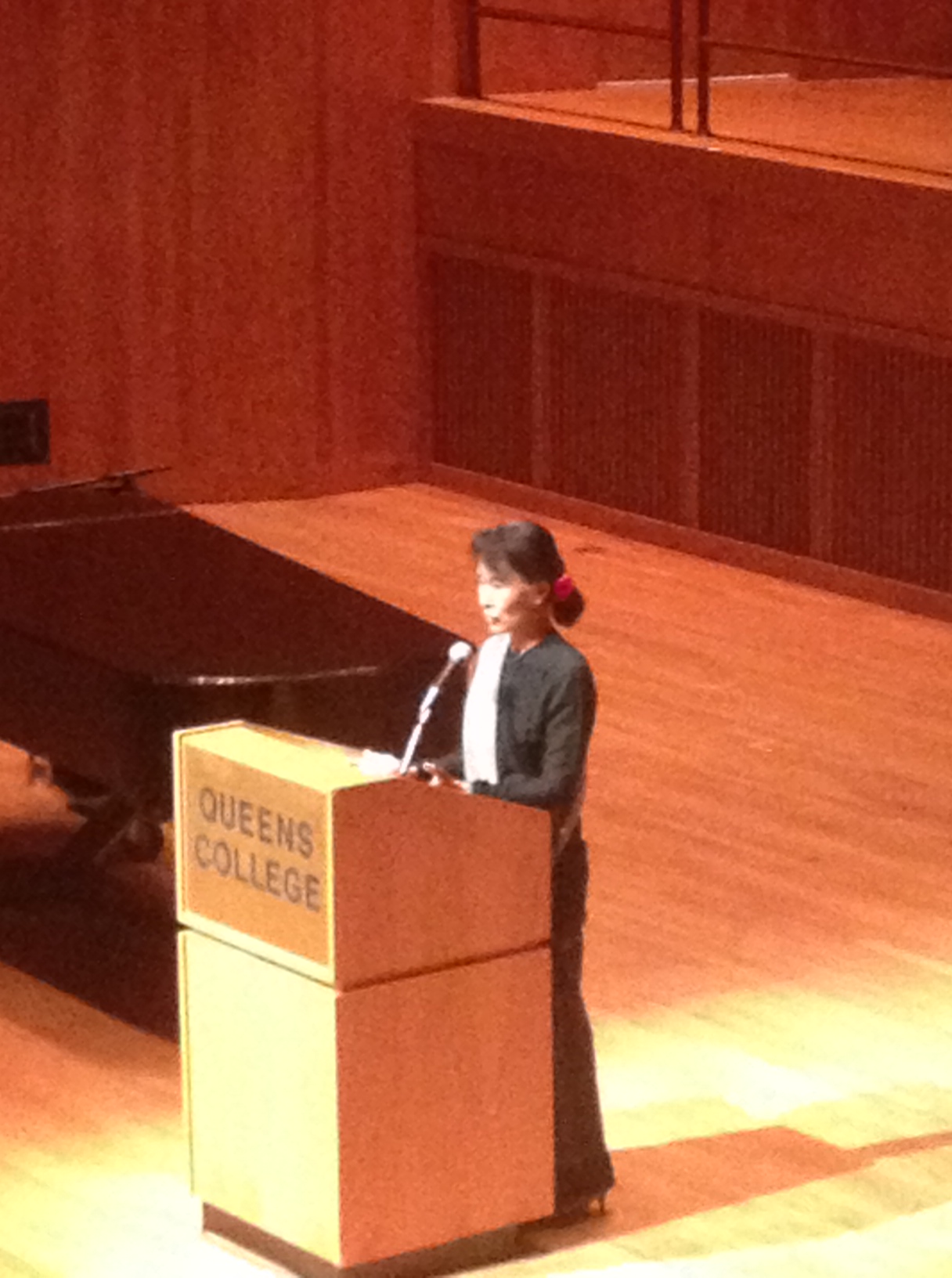 Just after dawn on Saturday Morning, my brother and I arrived at the gates of the Colden Center at Queens College, where Aung San Suu Kyi was schedule to speak later in the morning. A crowd had already started to form. Burmese Americans traveled from near and far to greet her. Some camped overnight with picnic blankets and lawn chairs. The queue was colorful, dotted with vibrant sarongs and longyis matched with sandals and sneakers. I spotted a tote bag bearing Aung San Suu Kyi’s face on one side, and her father, Aung San on the other. Some came carrying red flags with the golden peacock, the symbol of the National League for Democracy. A few hundred had arrived and a few thousand were expected to fill the hall during her Burmese address at 10:30 Am.
Just after dawn on Saturday Morning, my brother and I arrived at the gates of the Colden Center at Queens College, where Aung San Suu Kyi was schedule to speak later in the morning. A crowd had already started to form. Burmese Americans traveled from near and far to greet her. Some camped overnight with picnic blankets and lawn chairs. The queue was colorful, dotted with vibrant sarongs and longyis matched with sandals and sneakers. I spotted a tote bag bearing Aung San Suu Kyi’s face on one side, and her father, Aung San on the other. Some came carrying red flags with the golden peacock, the symbol of the National League for Democracy. A few hundred had arrived and a few thousand were expected to fill the hall during her Burmese address at 10:30 Am.
 Prior to this, there was an event in English at 9 am, organized by Queens College at their Lefrak Concert Hall. Congressman Joseph Crowley, a Queens College graduate, hosted the program. Crowley, wearing a Saffron colored tie for the occasion, noted he, like Aung San Suu Kyi, was currently in the minority party in our legislature, and that maybe he and Daw Suu, the leader of Burma’s opposition party, should exchange notes. Crowley acknowledged both Secretary Clinton and former first Lady Laura Bush’s support for Burma, and hoped for more bipartisanship on this issue.
Prior to this, there was an event in English at 9 am, organized by Queens College at their Lefrak Concert Hall. Congressman Joseph Crowley, a Queens College graduate, hosted the program. Crowley, wearing a Saffron colored tie for the occasion, noted he, like Aung San Suu Kyi, was currently in the minority party in our legislature, and that maybe he and Daw Suu, the leader of Burma’s opposition party, should exchange notes. Crowley acknowledged both Secretary Clinton and former first Lady Laura Bush’s support for Burma, and hoped for more bipartisanship on this issue.
When Crowley learned of Suu’s visit to the U.S. to receive the Congressional Gold Medal, he told her the people of New York wanted to see her. “We want to give you a very warm, a very Queens, New York City welcome.” Actress Angelica Huston read from Suu Kyi’s seminal essay “Freedom from Fear.” Christine Quinn, the first female speaker of NYC’s City Council, offered her gratitude to the newly elected Burmese MP. The city council has been active on fighting repression in Burma, and Quinn acknowledged comptroller John Liu in the audience who has been addressing this issue with respect to the city’s pension funds.
Quinn went on to tell Daw Suu the ways in which she has helped the city of New York. “To see what you have been through with an unbelievable amount of grace and dignity…It gives all of us strength and courage… and reminds all of us that faith and perseverance are always rewarded, ” Quinn said. “I hope you know what you have done for the 8.4 million people living in New York City…Reminding us that we have power. Reminding us that our voice maters and we are citizens of the world… we are in your debt every day.”
 Aung San Suu Kyi received a standing ovation and assumed her place at the podium. Dressed in dark green and black Burmese dress, with flowers in her hair, she addressed the crowd unscripted, giving a glimpse into the way her mind worked.
Aung San Suu Kyi received a standing ovation and assumed her place at the podium. Dressed in dark green and black Burmese dress, with flowers in her hair, she addressed the crowd unscripted, giving a glimpse into the way her mind worked.
She began talking about her love of New York when she had lived here many decades ago. “I loved the city at a time when people thought it was terrible. It was the only city in the world where I never got lost.” When she first arrived in 1968, she remembered her surprise to see that New York, a city of skyscrapers, did in fact look exactly like the post cards. She had a similar feeling when she was brought to Insein Prison for the first time. She was surprised that prison was just like the places with iron bars she read about in books. She recognized the similarity in these two moments, not to say that prison reminded her of New York (it did not), but to note that we can be surprised when we discover first hand that things are just like what we have been told. This applies too to the struggle for democracy and human rights in Burma.
“Many young Americans take it [democracy] for granted,” she said. “I always say to my friends who live in democratic countries: ‘Don’t take it for granted.’” She felt that those who didn’t vote showed “a lack of respect for a right you should guard with your life.” Democracy requires practice and we must practice our duty as a citizen. “Duty may sound like a boring word,” she said, “but duty is very stimulating if you really think about what duty is.” She argued challenges are exciting, and “the greatest challenges are the ones where you have to struggle with yourself.
Speaking to a college crowd, she said, “Young people here should not be ignorant of [the conditions] of young people elsewhere” After 50 years of military rule, the education system has “tottered” in Burma. [She was about to say collapsed, but opted for a more “moderate” word]. “At one time, Burma had the best education system in South East Asia, ” she continued. But now there is a growing gap between the few well-educated and the masses who “through no fault of their own have been ill prepared for the world into which they were born, ” she said.
“Education is the foundation of human dignity,” Suu argued. “Unless you know what your potential can be, you’ll never know how to realize it.” The young people in Burma will have to take over the responsibilities of nation building, she said, and they need assistance preparing for their rightful place in society. Speaking of young people, Suu mentioned that when she first met Crowley, she thought “what a well brought up young man!”
“There is nothing better in the world than to see young people who are caring and who understand the needs of others. I think human beings are born generous, but sometimes we have that generosity squeezed out of us by circumstances in which we have to grow up. Don’t let go of your generosity.” She pointed to Crowley who is almost 6’5”. “Look at your colleague, how large he is, his heart is big in every way.” Laughter warmed the room.
Several students had questions for Daw Suu. One had asked about the transition from being a dissident on the outside to an MP on the inside. She said that the transition has been perfectly natural. “Dissidents can’t be dissidents forever. We are dissidents because we don’t want to be dissidents.” She is enjoying her time in the legislature. “There is lot of fun to be had if you know how to go about it…I don’t believe in professional dissidents,” she said. “It’s a phase, like adolescence.”
Throughout this event and the later event in Burmese, her responses showed her sense of humor and her wit. After every remark in English or Burmese, the audience laughed and cheered or waved their red NLD flags. What I noticed is that Aung San Suu Kyi’s humor was never used to deflect the truth or evade a question, but rather to illuminate truth and provide a sincere response.
Another student asked about the activities she undertook while under house arrest. She hoped no one in the room would ever need this advice, but if anyone would find themselves in her position, she said: “Set yourself a very strict timetable.Otherwise you become undisciplined, which makes it more difficult to cope.” During the week, she kept to strict schedule of getting up, meditating, exercise, listening the radio, taking a bath and reading. She also believed in weekends and giving herself a break Saturday and Sunday not to adhere to a strict schedule.“This is the way I made my life under house arrest as normal as possible.”
In responding to a question of what inspired her to join the struggle in Burma, she said, it was partly because of her father. “Burma had not become the kind of country that he had meant it to be when he fought for independence.” Though the general Aung San died when Daw Suu was only two years old, he had a tremendous influence on her life. “I was always told I was his favorite child…Let me say this to parents: Anybody who believes that he or she has been truly loved by one person, this gives him or her tremendous confidence in life. I had this tremendous confidence that came from how much my father loved me.”
She went on to study his life very closely. “Although he was part of Burmese army, he was not really a man of violence, not really a man who preferred over confrontation to reconciliation… He was a man of quiet, deep, sincerity and tremendous warmth.
And to the question of how she kept going, she responds,“the simple answer is that I didn’t know how to stop. First because you don’t want to abandon your principles, and second because you don’t want to abandon your comrades.”
Singer and songwriter Carol King, another Queens College graduate, concluded the program by performing a modified version of her song “You’ve got a friend [Aung San Suu Kyi],” while the honored guest held hands with the elected officials and actress on the stage, swaying back and forth and singing along.
 Crowley presented Aung San Suu Kyi with a miniature replication of the Unisphere from the World’s Fair in Flushing. “We wanted to give you something that represented, New York and the World,” he said. And the motto of the fair —Peace through Understanding— also seemed appropriate.
Crowley presented Aung San Suu Kyi with a miniature replication of the Unisphere from the World’s Fair in Flushing. “We wanted to give you something that represented, New York and the World,” he said. And the motto of the fair —Peace through Understanding— also seemed appropriate.
After the event, a rally had been organized drawing attention to the persecution of the Rohingya Burmese muslims. Protesters urged Aung San Suu Kyi and her party to be more vocal on this issue. 
During the talk, Suu Kyi acknowledged some of the signs of change that have occurred in Burma, but also that there is much more work to be done. “We are not anywhere near our goal of a true democratic society.” At the end of her talk she told the room, “stay with us until we have completed the journey…when we, too, can help others in need, and Burma can once become the country it was way back before the military regime. We were a country of hope in our part of the world. We want to become a country that proves there can be such things as happy endings. When that happy ending arrives, I would like to welcome all of you Burma.”